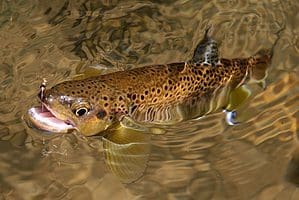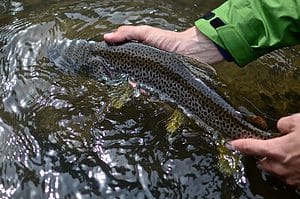Disclosure: Some posts contain affiliate links, which earn us a commission if you make a purchase through them. Positive Fishing © participates in various affiliate networks including the Amazon Services LLC Associates Program.
Catch and release fishing is always contentious among fishermen and the general public. Certain non-anglers believe this process is cruel and harmful to fish, but anglers will likely disagree.
I am inclined to write on this subject because of the misinformation and incorrect opinions of some claiming up to 20% of caught and released fish will die.
What % Of Fish Die During Catch And Release?
There are many types of fish in our rivers, lakes, and seas. Some fish are hardier than others and can survive with minimal losses. In my experience as a fisherman for the past 50 years, I can say that less than 1% die after catch and release.
I have also surveyed fishermen (including my writers, experienced fishermen in trout, salt, and freshwater fishing) and found the same high survival rate (above 99%) in fish after catch and release.
Even just one of the fish I catch after releasing it back into the water is always an unpleasant experience – big or small.
If 2 out of 10 were floating dead on the surface at the end of a fishing day, I would consider stopping fishing for good. The 20% numbers being quoted as dying is just not true!
How Can Anglers Reduce The Mortality Rate?

There are several important factors anglers can do to help reduce fish mortality.
- Learn more about how to unhook a fish correctly. Never use a towel, even if it’s a wet one. Always wet your hands and unhook the fish.
- Ensure that you pay attention whilst fishing; leaving your baited hook in the water is likely to have the fish gorge the bait into its gullet. This is a prime reason for fish mortality, as it is difficult to remove the hook safely.
- Always ensure you carry a disgorger and forceps. These help to unhook the fish safely and without damaging its mouth.
- Your fishing gear should include foam landing mats, fish cradles, and a bucket of water to douse onto the fish to keep it cool.
- Reduce the time the fish is out of the water as best as possible. If you plan to take photos, do it quickly and have everything ready beforehand.
- Wherever possible, use barbless hooks. Whilst a fish will not die from unhooking – the faster you can unhook, the better for the fish. Barbless hooks are easier to remove and cause less damage to the fish’s mouth.
- Educate the youngsters and new anglers. Many fish are mishandled and thrown back by inexperienced anglers. Teach them young what to do and what not to do!
- Use lighter fishing lines and gear where possible. Take time landing the fish to avoid any stress or force applied to them while on the hook.
- If any fish has cuts or marks, apply appropriate fish medicine to their wounds. Every angler should always carry a carp care kit in their tackle box.
- Make sure that the fish, when returned to the water, are held gently and allowed to swim off slowly at their own pace; do not throw or push them.
- Use the right type of fishing nets. They should be made from soft materials and have a knotless fine mesh.
- If you are fishing in very hot weather, be even more diligent in getting fish back to the water quickly. Fish will survive less if kept out of water during the year’s hottest months.
- If a hook is buried deep into the fish, it is advisable to cut the line as close to the hook as possible and then release it. Hooks will corrode over time, and the fish can still survive and eat as normal with a hook inside it.
- Don’t touch the fish too often; extra handling creates even more stress and can remove its protective slime layer.
Why Do Fish Die In Catch And Release Fishing
Anglers’ Knowledge And Experience
This is by far the biggest reason why fish die when being caught by anglers. Unfortunately, many who go fishing are only on vacation or not well-versed in fishing knowledge or the art of fishcraft.
If you are not sure what you should do when planning a fishing trip, make sure that you learn the basics of looking after fish first and what the correct things to do when you catch one are.
Wrong Fishing Gear
Today, beginner fishing tackle is sold everywhere, and whilst it gets new people into the sport of fishing, much of this tackle is poorly made or just cheap rubbish.
Make sure you select the right gear; it doesn’t need to be expensive but must match the fish and the fishing style you plan to use it for.
For example, some starter fishing kits include a 20lbs line for a small rod and reel! There is a major lack of responsibility in some companies selling this type of fishing gear; do your homework before you buy. There are many resources available to help choose the correct gear. Check out my article on the best fly fishing starter kits covering various quality budget options.
Stress
Fish suffer stress during the catching process and while out of the water for too long. It is correct to state that stress is the most common cause of mortality in catch and release fishing.
Time Exposed to the Air
The longer the fish is out of the water, the lower the chance it has to survive. Some studies show that fish held out of the water for more than 30 seconds have a 62% chance of survival, and fish held out of the water for greater than 60 seconds only have even less chance of survival.
However, if the right process is followed, these times are grossly under-calculated. Keeping the fish cool and wet can increase these times far longer.
Location Of The Hook In The Fish
Any fish hooked in the guts, gills, or deep in the throat has a much lower chance of survival. Fish such as perch tend to swallow the bait, making removing the hook difficult.
Leaving your rod alone without attention will make fish swallow more than the bait; when you watch your bobber or bite indicator and strike at the right time, this will lead to far less deep-hooked fish.
Always unhook a fish using a hook disgorger when you find a deeply hooked fish. This will significantly decrease the chances of causing damage to the fish.
How Long Can Fish Survive Out of Water?
The survival time of fish out of water varies significantly across different species. It depends on many factors, including their physiological adaptations, habitat nature, and environmental conditions they encounter when removed from water. Some species can endure for mere seconds, while others, due to specialized adaptations, can survive for extended periods.
In my observations, the ability of a fish to breathe air and its habitat play critical roles in determining its survival time on land. Freshwater fish, for example, often have a lower tolerance out of water than their saltwater counterparts because of their more delicate gill structures. Conversely, certain fish have evolved to possess specialized organs that allow them to breathe air, adapting them to temporary life outside the water.
Three critical factors play a significant role in determining the survival time of a fish once it’s left the aquatic environment.
Species Variability
Different fish species have evolved to survive out of water for varying durations. For instance, betta fish and lungfish have adaptations that allow them to endure longer on land. In contrast, aquatic species like goldfish often struggle to survive for more than a few minutes out of water. These variations are intimately linked to the fish’s biological and physiological traits, which dictate their resilience when exposed to air.
Environmental Conditions
My research indicates that the survival of fish out of water is significantly affected by the environment. Factors such as humidity, temperature, and exposure to direct sunlight can either shorten or extend a fish’s ability to live once removed from water. High humidity and cooler temperatures, for example, help keep the gills moist, thereby slightly prolonging survival.
Adaptation Mechanisms
Fish like the Anabas testudineus or the climbing perch have developed unique adaptation mechanisms for survival outside water. Such fish can breathe air using specialized organs, allowing them to live on land for extended periods, sometimes up to several hours. This ability is an evolutionary response to living in environments frequently subjected to drought or oxygen-depleted water.
Do Fish Heal After Being Hooked?
Yes, fish always heal wounds fast after being hooked. However, any wound can get infected, and it is important that if you do see any wounds on the body or mouth, they are treated with an antiseptic lotion or liquid before being released back into the water.
Fish can reproduce the slime that is on their bodies, this slime protects the fish from bacteria, and is critical in reducing infections.
How To Release Fish Safely?

Careful handling of fish of all sizes is of utmost importance whether we intend to keep or release the fish, especially in the latter case.
Always check the fish thoroughly for damage or diseases. Even remove any leeches that you find on the fish’s body.
Make sure that you fully support the weight of the fish with both hands and never hold any fish by its jaw or head. Allow the fish to swim from your hands. If the fish is looking slow to swim away, hold it till it has recovered its breath and is ready to go.
If it’s still reluctant to swim off, gently moving the fish from side to side in the water can help regain its balance.
If you release a fish back into a river, find a slower current area and avoid any fast currents.
Final Thoughts
The mortality rate of fish after catch and release varies widely depending on several factors, including the species of fish, the method of capture, handling time, and environmental conditions.
Fishing has been around for hundreds of years. Catch and release practices have become far more popular over the past few years, and fishing equipment, tools, and techniques to help successful catch and release continue to improve.
Experienced anglers truly care and respect all the fish they catch; every angler (young and old) must gain better knowledge to reduce the mortality rates.
You can read more on catch and release fishing, including guidelines and government regulations on what fish can be legally taken from waters.
- 5 Best Fishing Bags For Getting Your Gear Organized - January 13, 2025
- 4 Essential Surf Fishing Rigs - January 11, 2025
- How To Know The Sex Of A Fish You Have Caught? - December 9, 2024

